Serving 316 students in grades 1-6, Summit Elementary School ranks in the bottom 50% of all schools in Mississippi for overall test scores (math proficiency is bottom 50%, and reading proficiency is bottom 50%).
The percentage of students achieving proficiency in math is 30-34% (which is lower than the Mississippi state average of 47%). The percentage of students achieving proficiency in reading/language arts is 30-34% (which is lower than the Mississippi state average of 42%).
The student:teacher ratio of 18:1 is higher than the Mississippi state level of 13:1.
Minority enrollment is 95% of the student body (majority Black), which is higher than the Mississippi state average of 58% (majority Black).
Quick Stats (2025)
- Grades: 1-6
- Enrollment: 316 students
- Student:Teacher Ratio: 18:1
- Minority Enrollment: 95%
- Overall Testing Rank: Bottom 50% in MS
- Math Proficiency: 30-34% (Btm 50%)
- Reading Proficiency: 30-34% (Btm 50%)
- Science Proficiency: 50-59% (Top 50%)
- Source: National Center for Education Statistics (NCES), MS Dept. of Education
Top Rankings
Summit Elementary School ranks among the top 20% of public schools in Mississippi for:
Category
Attribute
Percent Eligible For Free Lunch
School Overview
Summit Elementary School's student population of 316 students has grown by 11% over five school years.
The teacher population of 18 teachers has grown by 12% over five school years.
Grades Offered
Grades 1-6
Total Students
316 students
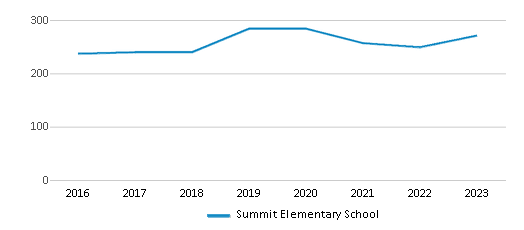
Gender %
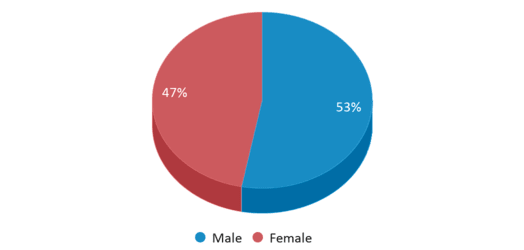
Total Classroom Teachers
18 teachers
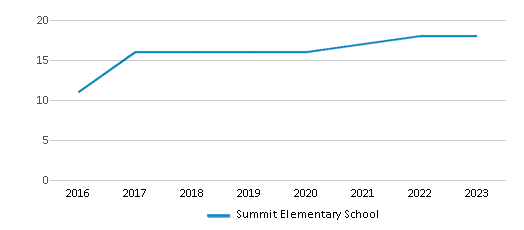
Students by Grade
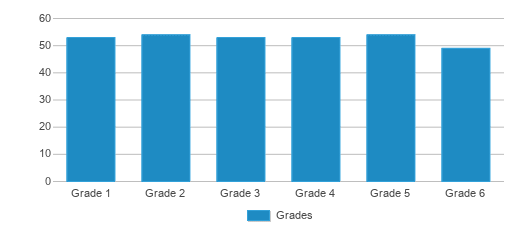
School Rankings
Summit Elementary School ranks within the bottom 50% of all 805 schools in Mississippi (based off of combined math and reading proficiency testing data).
The diversity score of Summit Elementary School is 0.17, which is less than the diversity score at state average of 0.61. The school's diversity has stayed relatively flat over five school years.
Overall Testing Rank
#536 out of 805 schools
(Bottom 50%)
(Bottom 50%)
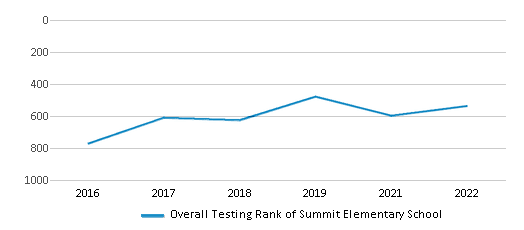
Math Test Scores (% Proficient)
30-34%
47%
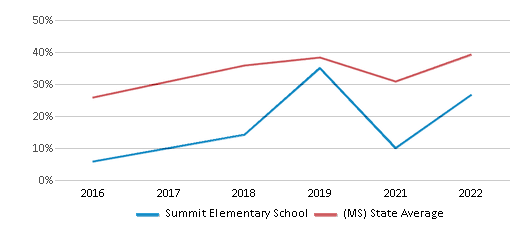
Reading/Language Arts Test Scores (% Proficient)
30-34%
42%
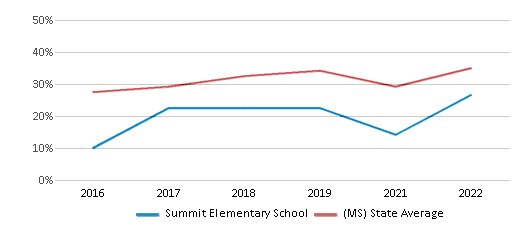
Science Test Scores (% Proficient)
50-59%
55%
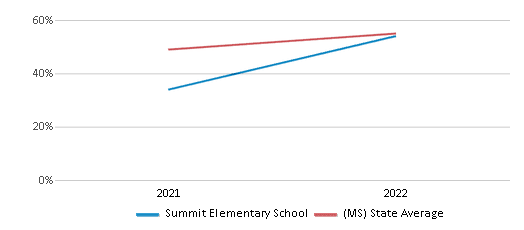
Student : Teacher Ratio
18:1
13:1
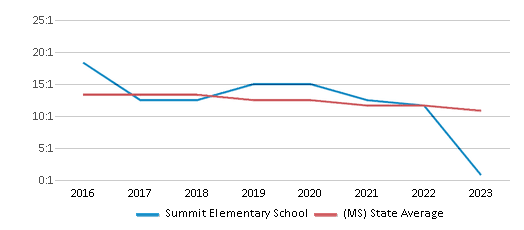
American Indian
n/a
1%
Asian
n/a
1%
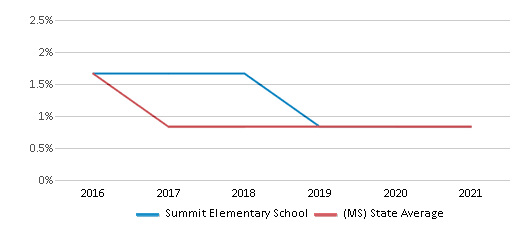
Hispanic
1%
5%
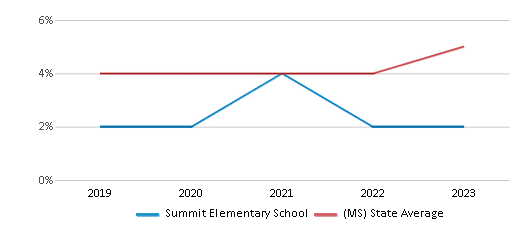
Black
91%
47%
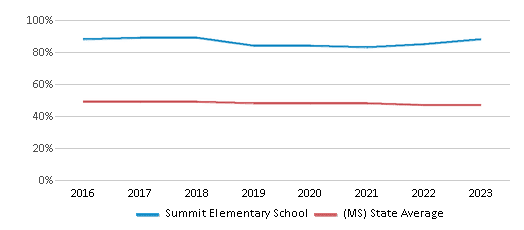
White
5%
42%
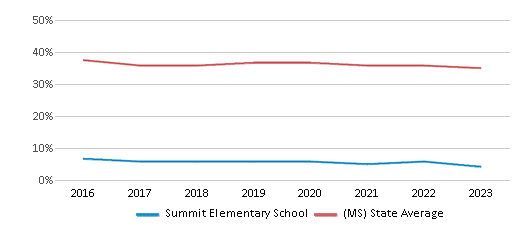
Hawaiian
n/a
n/a
Two or more races
3%
4%
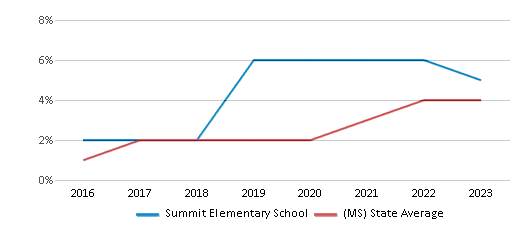
All Ethnic Groups
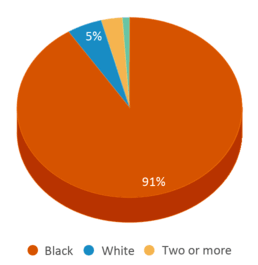
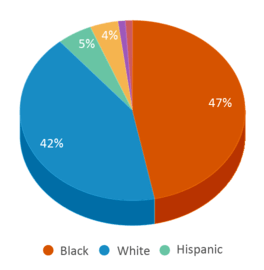
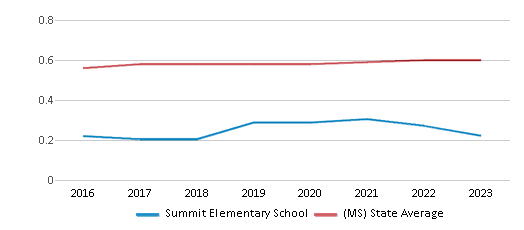
Participates in the National School Lunch Program (NSLP)
Yes
Eligible for Free Lunch
100%
68%
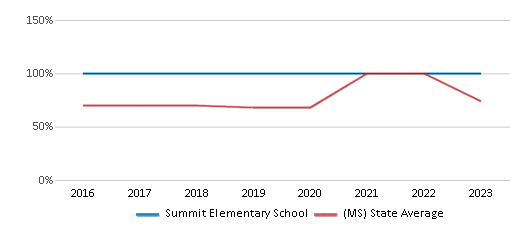
School Statewide Testing
School District Name
Source: National Center for Education Statistics (NCES), MS Dept. of Education
Profile last updated: 02/09/2025
Frequently Asked Questions
What is Summit Elementary School's ranking?
Summit Elementary School is ranked #536 out of 805 schools, which ranks it among the bottom 50% of public schools in Mississippi.
What percent of students have achieved state testing proficiency in math and reading?
30-34% of students have achieved math proficiency (compared to the 47% MS state average), while 30-34% of students have achieved reading proficiency (compared to the 42% MS state average).
How many students attend Summit Elementary School?
316 students attend Summit Elementary School.
What is the racial composition of the student body?
91% of Summit Elementary School students are Black, 5% of students are White, 3% of students are Two or more races, and 1% of students are Hispanic.
What is the student:teacher ratio of Summit Elementary School?
Summit Elementary School has a student ration of 18:1, which is higher than the Mississippi state average of 13:1.
What grades does Summit Elementary School offer ?
Summit Elementary School offers enrollment in grades 1-6
What school district is Summit Elementary School part of?
Summit Elementary School is part of Mccomb School District.
School Reviews
1 4/14/2021
0/5 stars. Before COVID, there was no time that we could talk. Not in class (obviously), we did not have recess or anything; we had to stay quiet at breakfast/lunch, and we could not talk at dismissal. Usually in the classroom, there is a water fountain and a restroom in the hallway. This room did not have either. We could only use the bathroom twice a day, but luckily there was this nice teacher that let me go more. Here was the cruel part: There was this one kid, who talked. No water before or after P.E. No water at all (unless it was lunch, then they had these painfully small cups). 30 minutes of nonstop exercise, summer heat (because it's hot in Mississippi), and no water. I can see why they restricted some sites on the iPads, but they restricted literally everything. Learning games, educational sites, and more. These restrictions are dumb, because we can use a certain link to get into Facebook and Reddit (Those are the only ones I found). They threaten to take away our iPads of we act badly, but they restrict so many things that it won't even make a difference if we use pencil and paper.
Review Summit Elementary School. Reviews should be a few sentences in length. Please include any comments on:
- Quality of academic programs, teachers, and facilities
- Availability of music, art, sports and other extracurricular activities
Recent Articles

What Is A Charter School?
Explore the world of charter schools in this comprehensive guide. Learn about their history, how they operate, and the pros and cons of this educational innovation. Discover key facts about charter schools, including admission policies, demographics, and funding, as well as what to look for when considering a charter school for your child.

10 Reasons Why High School Sports Benefit Students
Discover the 10 compelling reasons why high school sports are beneficial for students. This comprehensive article explores how athletics enhance academic performance, foster personal growth, and develop crucial life skills. From improved fitness and time management to leadership development and community representation, learn why participating in high school sports can be a game-changer for students' overall success and well-being.

February 05, 2025
Understanding the U.S. Department of Education: Structure, Impact, and EvolutionWe explore how the Department of Education shapes American education, from its cabinet-level leadership to its impact on millions of students, written for general audiences seeking clarity on this vital institution.





